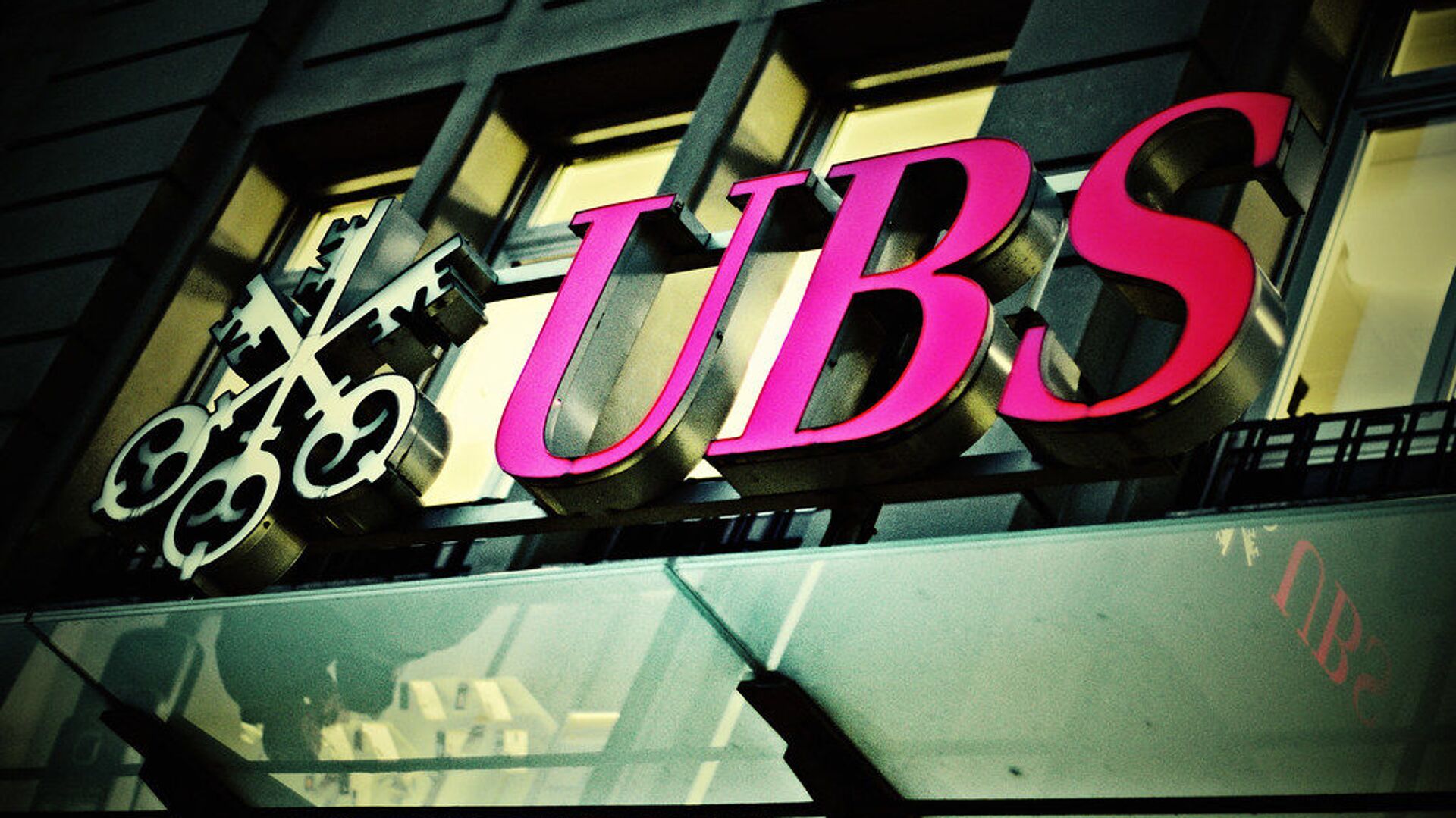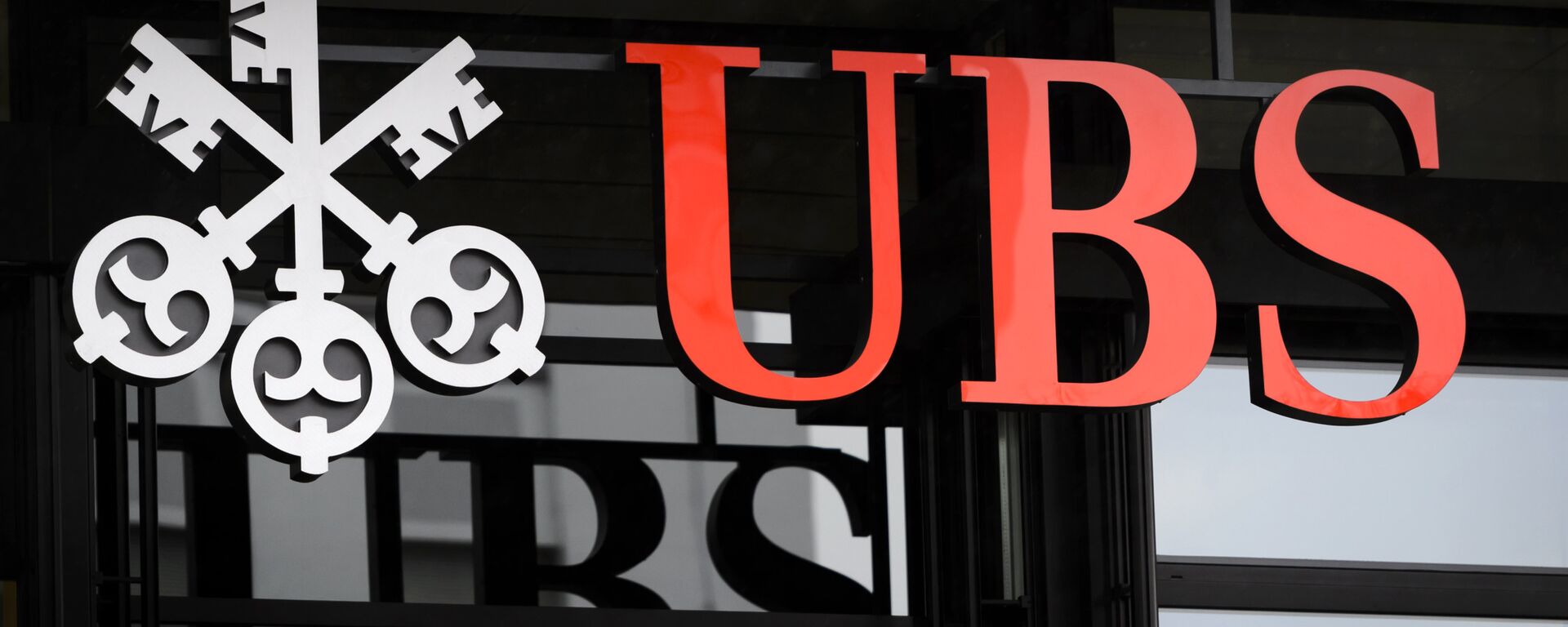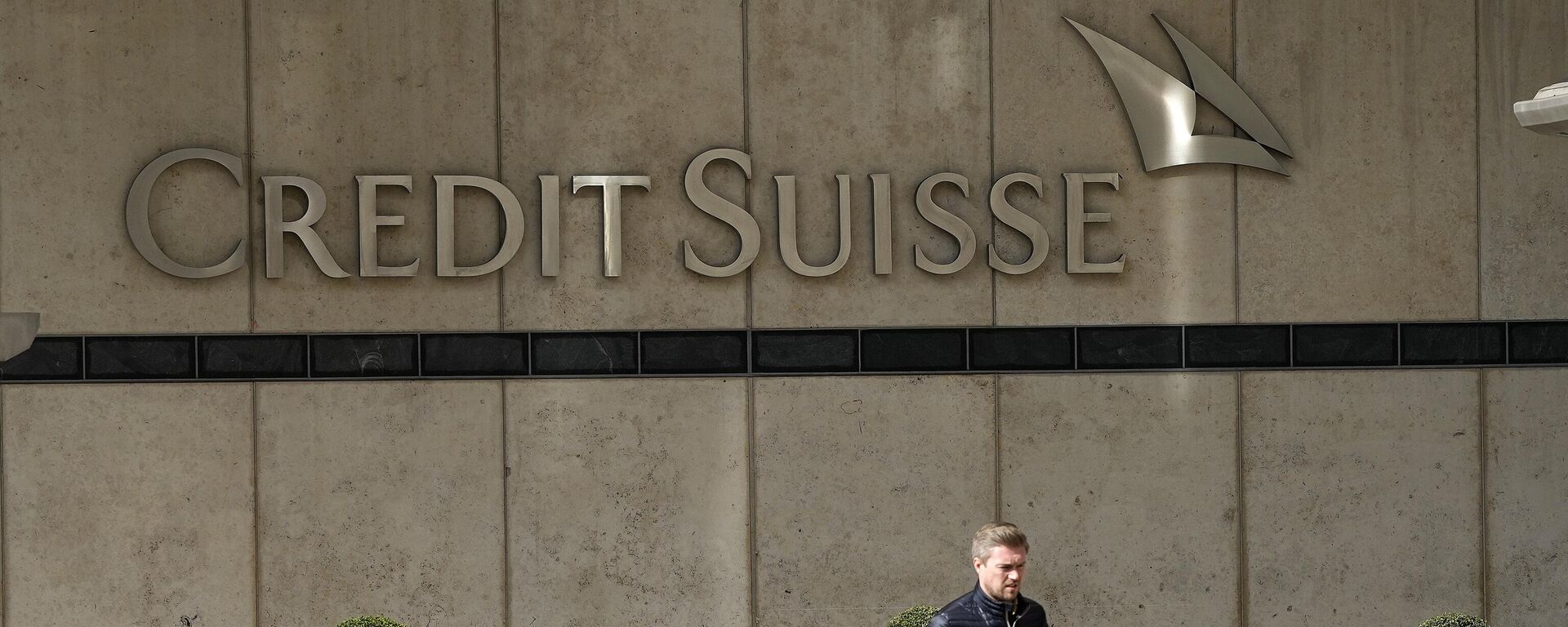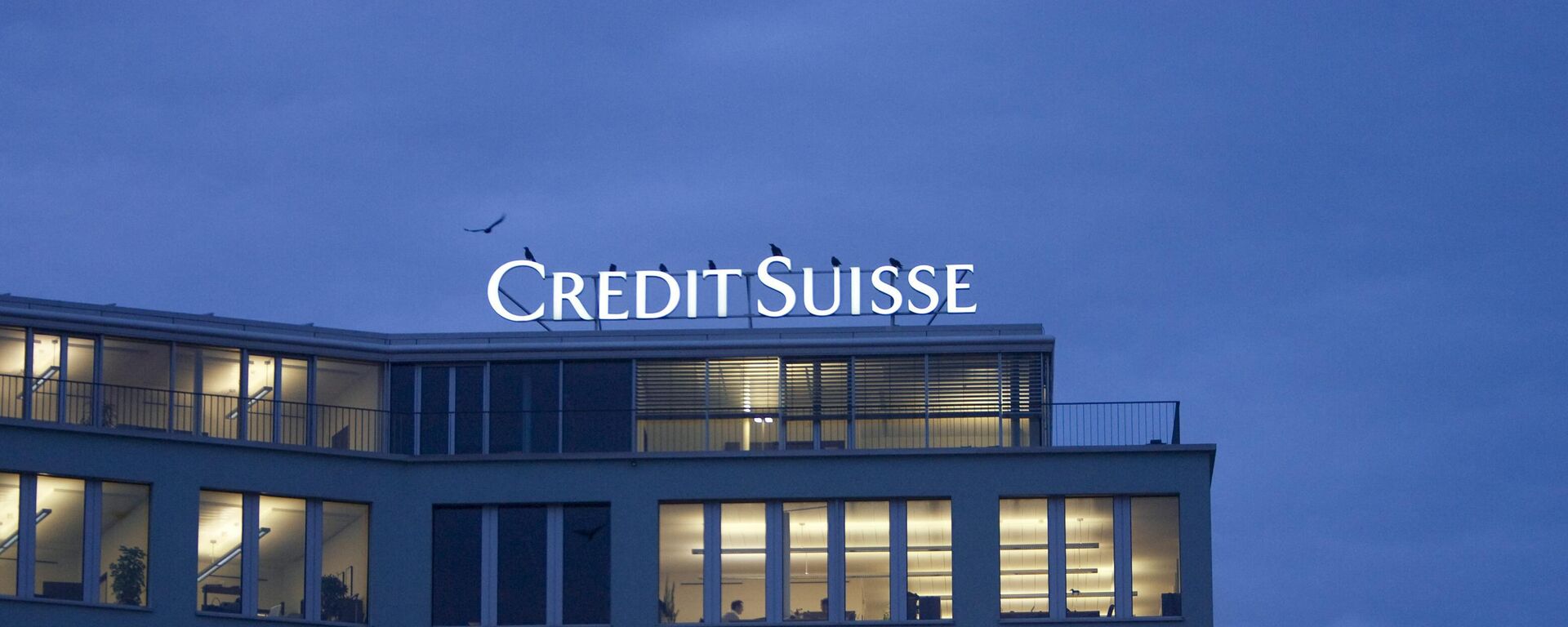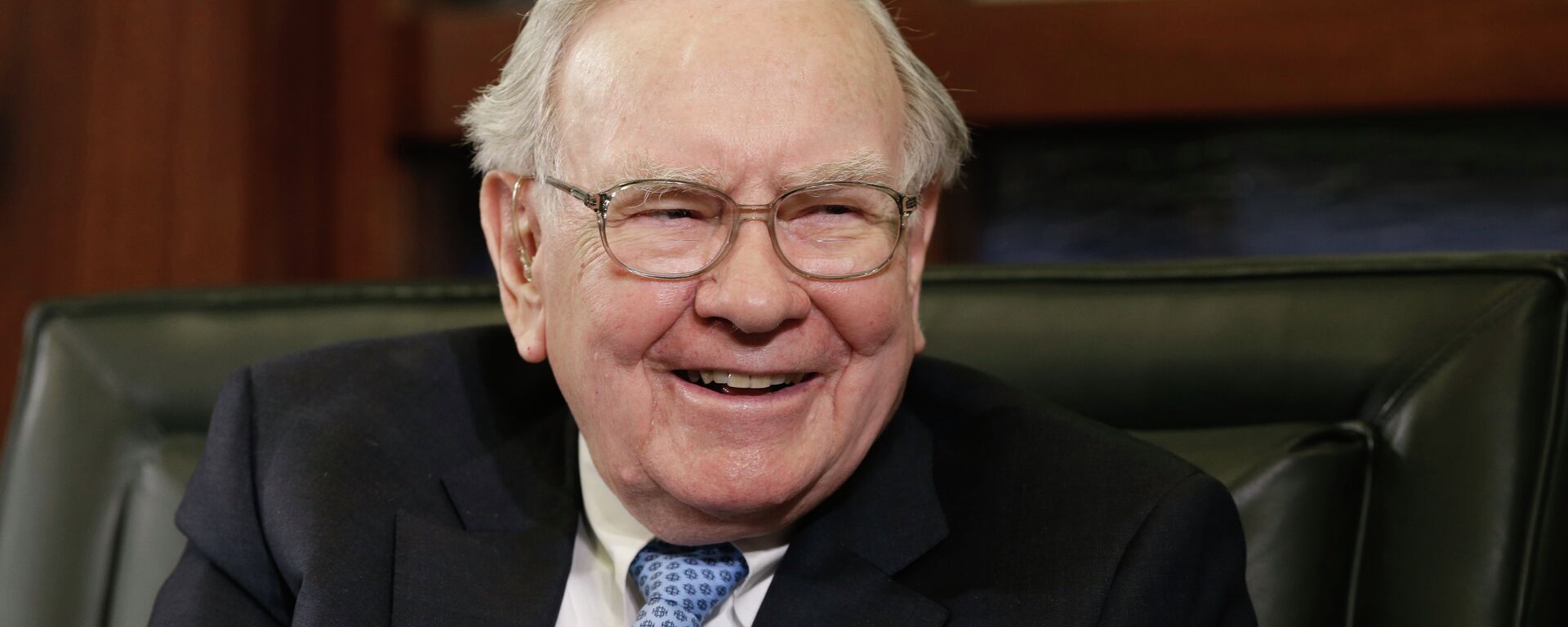https://sputnikglobe.com/20230320/what-happened-with-credit-suisse-and-why-is-ubs-buying-it-1108613201.html
What Happened to Credit Suisse and Why is UBS Buying It?
What Happened to Credit Suisse and Why is UBS Buying It?
Sputnik International
UBS agreed to buy troubled smaller banking rival Credit Suisse on March 19 in a $3.2 billion deal with with Swiss authorities expected to change the country’s laws to bypass a shareholder vote.
2023-03-20T17:21+0000
2023-03-20T17:21+0000
2023-03-20T17:53+0000
sputnik explains
us
europe
switzerland
ubs
credit suisse group ag
ubs group ag
merger
corporate merger
https://cdn1.img.sputnikglobe.com/img/107591/52/1075915288_0:53:1023:628_1920x0_80_0_0_f6d648b85a1f8771151dc0c4fa4803a7.jpg
UBS Group AG is a multinational investment bank and financial services company incorporated and domiciled in Switzerland. On March 19, the financial institution agreed to take over its longtime rival Credit Suisse Group AG, with the terms of the deal having been heavily influenced by the Swiss National Bank (SNB) and regulator Finma in a bid to prevent a banking crisis.Why is UBS Buying Credit Suisse?UBS agreed to step in and buy Credit Suisse in an emergency rescue deal to curb financial market panic, largely prompted by earlier collapse of the two regional US banks Silicon Valley Bank and Signature Bank.On March 15, investors sent Credit Suisse shares down by as much as 30% after the SNB, its top shareholder, ruled out providing it with fresh funding earlier that week. Credit Suisse had suffered from a number of strategic mistakes, notably in investment banking activities, including its exposure to failed hedge fund Archegos and financial services firm Greensill. The magnitude of Credit Suisse losses resulted in the outflow of client money, which reached unprecedented levels in October 2022. All in all, customers withdrew a staggering $133 billion from Credit Suisse last year.What Сaused Credit Suisse to Fail?On March 16, it was announced that Credit Suisse would borrow over 50 billion Swiss Francs ($53.7 billion) from the SNB to stay afloat. However, according to the Swiss government, it was not enough. Over a few days, the nation's government brokered a hasty deal envisaging the acquisition of Credit Suisse by bigger UBS. The Swiss regulators signaled on March 19 that the deal was the best way of reassuring investors about the strength of the country’s financial sector. According to some reports, Swiss authorities raced against the clock to make the deal happen before Asian markets opened for the week.What are the Terms of the Deal?The deal will be an all-share transaction, with Credit Suisse shareholders receiving one UBS share for every 22.48 Credit Suisse shares, valuing it at about 3 billion Swiss francs ($3.2 billion). The Swiss government stated that it would disburse over $9 billion to compensate for losses that UBS may have by taking over its rival. The SNB also provided over $100 billion of liquidity to UBS to facilitate the conclusion of the agreement."The extraordinary government support will trigger a complete writedown of the nominal value of all AT1 shares of Credit Suisse in the amount of around SFr16 billion ($17 billion), and thus an increase in core capital," Finma announced.Some people involved in the deal's negotiations as well as some bankers told Financial Times that those steps would have wider repercussions and may lead to a sell-off of other bank debt and may even result in the “nightmare” in European debt markets.The US press raised concerns about the Swiss government literally changing laws and undermining shareholder rights in order to strike the deal quickly. As a rule of thumb, in any acquisition of a publicly traded company, the acquired company's shareholders have a right to vote for or against the move. Even though Credit Suisse shares were listed in both New York and Zurich, the Swiss government unilaterally eliminated the voting rights. One might ask whether the Swiss government sets a precedent which other governments will follow in order to prevent a banking crisis.Which Bank is Bigger, UBS or Credit Suisse?UBS Group AG and Credit Suisse Group AG were regarded as two pillars of the Swiss financial industry. UBS, formerly Union Bank of Switzerland, was founded in 1862 as the Bank in Winterthur. Its rival, Credit Suisse, was established a bit earlier, in 1856.For comparison's sake, UBS has about $3 trillion assets in management, more than 74,000 employees working in 48 countries and representing 150 nationalities.Remarkably, Credit Suisse managed to survive the 2008 financial crisis better than UBS. At the time, UBS fell victim to its high-risk strategy of expansion in the US. When the mortgage crisis erupted, UBS became the most exposed foreign bank on the US real estate funds and derivatives market. This prompted the Swiss government and the nation's central bank to step in and bail UBS out.What's so Special About UBS?UBS is Switzerland's biggest bank. Furthermore, it's the third largest bank in Europe. UBS is also one of the nine global "Bulge Bracket" banks. Bulge bracket banks are the world's largest multinational investment banks, serving large corporations and governments. The list includes Bank of America Merrill Lynch, Goldman Sachs, Barclays Capital, Credit Suisse, Deutsche Bank, JPMorgan Chase, Citigroup, Morgan Stanley, and UBS.Does UBS Operate in Russia?Following the beginning of the Russian special military operation to demilitarize and de-Nazify Ukraine, UBS brought its ties with Russia to naught. In February 2022, the Swiss government announced that it would adopt wholesale EU sanctions against Moscow.In March 2022, the Swiss Bankers Association (SBA) revealed that approximately $200 billion of Russian wealth was held in Swiss banks, the majority of whom were not subject to sanctions. At the same time UBS halted new business in Russia. As of April 2022, UBS held around $22 billion in invested assets for Russian clients potentially affected by EU and Swiss measures imposed to punish Moscow, according to Reuters. According to the nation's State Secretariat for Economic Affairs (SECO), $6.8 billion of Russian assets had been frozen by July 2022.In December 2022, the Central Bank of the Russian Federation canceled the license of UBS on the basis of an application submitted by the Swiss bank.
https://sputnikglobe.com/20230320/ubs-shares-plunge-after-emergency-rescue-of-embattled-swiss-rival-credit-suisse--1108603088.html
https://sputnikglobe.com/20230316/credit-suisse-sued-over-claims-of-failure-to-report-internal-control-weaknesses-1108483231.html
https://sputnikglobe.com/20230317/credit-suisse-collapse-was-inevitable-after-years-of-mismanagement-insider-says-1108509185.html
https://sputnikglobe.com/20230319/warren-buffett-advising-white-house-on-banking-dumpster-fire-as-economists-compare-it-to-2008-1108576804.html
switzerland
Sputnik International
feedback@sputniknews.com
+74956456601
MIA „Rossiya Segodnya“
2023
News
en_EN
Sputnik International
feedback@sputniknews.com
+74956456601
MIA „Rossiya Segodnya“
Sputnik International
feedback@sputniknews.com
+74956456601
MIA „Rossiya Segodnya“
ubs credit suisse, ubs credit suisse news, credit suisse news today, what happened to credit suisse, ubs credit suisse deal, ubs news, credit suisse share price, credit suisse collapse, what is issue with credit suisse, ubs buy credit suisse, deal ubs to buy credit suisse, credit suisse and ubs to merge, ubs is buying credit suisse, ubs and credit suisse, ubs and credit suisse merger
ubs credit suisse, ubs credit suisse news, credit suisse news today, what happened to credit suisse, ubs credit suisse deal, ubs news, credit suisse share price, credit suisse collapse, what is issue with credit suisse, ubs buy credit suisse, deal ubs to buy credit suisse, credit suisse and ubs to merge, ubs is buying credit suisse, ubs and credit suisse, ubs and credit suisse merger
What Happened to Credit Suisse and Why is UBS Buying It?
17:21 GMT 20.03.2023 (Updated: 17:53 GMT 20.03.2023) UBS agreed to buy troubled smaller banking rival Credit Suisse on March 19 in a $3.2 billion deal with with Swiss authorities expected to change the country’s laws to bypass a shareholder vote. What is UBS and why did it decide to absorb Credit Suisse?
UBS Group AG is a multinational investment bank and financial services company incorporated and domiciled in Switzerland. On March 19, the financial institution agreed to take over its longtime rival Credit Suisse Group AG, with the terms of the deal having been heavily influenced by the Swiss National Bank (SNB) and regulator Finma in a bid to prevent a banking crisis.
Why is UBS Buying Credit Suisse?
UBS agreed to step in and buy Credit Suisse in an emergency rescue deal to curb financial market panic, largely prompted by earlier collapse of the two regional US banks Silicon Valley Bank and Signature Bank.
On March 15, investors
sent Credit Suisse shares down by as much as 30% after the SNB, its top shareholder, ruled out providing it with fresh funding earlier that week. Credit Suisse had suffered from a number of strategic mistakes, notably in investment banking activities, including its exposure to failed hedge fund Archegos and financial services firm Greensill. The magnitude of Credit Suisse losses resulted in the outflow of client money, which reached unprecedented levels in October 2022. All in all, customers withdrew a staggering $133 billion from Credit Suisse last year.
What Сaused Credit Suisse to Fail?
On March 16, it was announced that Credit Suisse would borrow over 50 billion Swiss Francs ($53.7 billion) from the SNB to stay afloat. However, according to the Swiss government, it was not enough. Over a few days, the nation's government brokered a hasty deal envisaging the acquisition of Credit Suisse by bigger UBS. The Swiss regulators signaled on March 19 that the deal was
the best way of reassuring investors about the strength of the country’s financial sector. According to some reports, Swiss authorities raced against the clock to make the deal happen before Asian markets opened for the week.
What are the Terms of the Deal?
The deal will be an all-share transaction, with Credit Suisse shareholders receiving one UBS share for every 22.48 Credit Suisse shares, valuing it at about 3 billion Swiss francs ($3.2 billion). The Swiss government stated that it would disburse over $9 billion to compensate for losses that UBS may have by taking over its rival. The SNB also provided over $100 billion of liquidity to UBS to facilitate the conclusion of the agreement.
For its part, Finma, the Swiss financial regulator, took a series of extraordinary steps to open the door to the merger. In particular, Finma wiped out $17 billion worth of Credit Suisse’s bonds and stripped shareholders of the ability to vote on the deal.
"The extraordinary government support will trigger a complete writedown of the nominal value of all AT1 shares of Credit Suisse in the amount of around SFr16 billion ($17 billion), and thus an increase in core capital," Finma announced.
Some people involved in the deal's negotiations as well as some bankers told Financial Times that those steps would have wider repercussions and may lead to a sell-off of other bank debt and may even result in the “nightmare” in European debt markets.
The US press raised concerns about the Swiss government literally changing laws and undermining shareholder rights in order to strike the deal quickly. As a rule of thumb, in any acquisition of a publicly traded company, the acquired company's shareholders have a right to vote for or against the move. Even though Credit Suisse shares were listed in both New York and Zurich, the Swiss government unilaterally eliminated the voting rights. One might ask whether the Swiss government sets a precedent which other governments will follow in order to prevent a banking crisis.
Which Bank is Bigger, UBS or Credit Suisse?
UBS Group AG and Credit Suisse Group AG were regarded as two pillars of the Swiss financial industry. UBS, formerly Union Bank of Switzerland, was founded in 1862 as the Bank in Winterthur. Its rival, Credit Suisse, was established a bit earlier, in 1856.
UBS is bigger than its rival; however, Credit Suisse has long boasted considerable influence having over 50,000 employees and 1.3 trillion Swiss francs ($1.4 trillion) in assets under management at the end of 2022.
For comparison's sake, UBS has about $3 trillion assets in management, more than 74,000 employees working in 48 countries and representing 150 nationalities.
Remarkably, Credit Suisse managed to survive the 2008 financial crisis better than UBS. At the time, UBS fell victim to its high-risk strategy of expansion in the US. When the mortgage crisis erupted, UBS became the most exposed foreign bank on the US real estate funds and derivatives market. This prompted the Swiss government and the nation's central bank to step in and bail UBS out.
What's so Special About UBS?
UBS is Switzerland's biggest bank. Furthermore, it's the third largest bank in Europe. UBS is also one of the nine global "Bulge Bracket" banks. Bulge bracket banks are the world's largest multinational investment banks, serving large corporations and governments. The list includes Bank of America Merrill Lynch, Goldman Sachs, Barclays Capital, Credit Suisse, Deutsche Bank, JPMorgan Chase, Citigroup, Morgan Stanley, and UBS.
Does UBS Operate in Russia?
Following the beginning of the Russian special military operation to demilitarize and de-Nazify Ukraine, UBS brought its ties with Russia to naught. In February 2022, the Swiss government announced that it would adopt wholesale EU sanctions against Moscow.
In March 2022, the Swiss Bankers Association (SBA) revealed that approximately $200 billion of Russian wealth was held in Swiss banks, the majority of whom were not subject to sanctions. At the same time UBS halted new business in Russia. As of April 2022, UBS held around $22 billion in invested assets for Russian clients potentially affected by EU and Swiss measures imposed to punish Moscow, according to Reuters. According to the nation's State Secretariat for Economic Affairs (SECO), $6.8 billion of Russian assets had been frozen by July 2022.
In December 2022, the Central Bank of the Russian Federation canceled the license of UBS on the basis of an application submitted by the Swiss bank.
